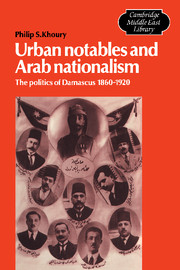Book contents
- Frontmatter
- Contents
- List of maps
- Note on transcription
- Preface
- Introduction
- 1 The political configuration of Damascus in 1860
- 2 The consolidation of leadership in Damascus after 1860
- 3 Damascus notables and the rise of Arab nationalism before World War I
- 4 Notables, nationalists and Faysal's Arab government in Damascus, 1918–20
- Conclusion
- Notes
- Bibliography
- Glossary of Arabic, Persian and Turkish terms
- Index
4 - Notables, nationalists and Faysal's Arab government in Damascus, 1918–20
Published online by Cambridge University Press: 14 October 2009
- Frontmatter
- Contents
- List of maps
- Note on transcription
- Preface
- Introduction
- 1 The political configuration of Damascus in 1860
- 2 The consolidation of leadership in Damascus after 1860
- 3 Damascus notables and the rise of Arab nationalism before World War I
- 4 Notables, nationalists and Faysal's Arab government in Damascus, 1918–20
- Conclusion
- Notes
- Bibliography
- Glossary of Arabic, Persian and Turkish terms
- Index
Summary
Most members of the Syrian political élite opted to identify with Arabism only after European and Sharifian troops occupied the Syrian provinces of the Ottoman Empire in 1918. For these men the occupation signified the final defeat of the Empire. Consequently its prevailing ideology, Ottomanism, no longer served their interests. Their switch to Arabism was a convenient one, designed both to fill an ideological void and to protect their standing in local society. With no other viable option left, they embraced Arabism hoping to mold it in their own image and thereby to continue practicing politics from a position of strength.
In the case of the older generation of Damascus notables, who had collaborated closely with the CUP until the Turkish defeat, shifting allegiance to Arabism was particularly difficult. The extermination, exile or quasi-conversion of their chief Arabist political rivals before and during the War, some of whom were relatives, created a considerable amount of bad blood. The draconian measures adopted by the CUP aroused the anger and hatred of many young Arab nationalists and turned several prominent older notables against the Turks and their allies in Damascus before the end of the War. But since the Arabists were accused of intriguing with the declared wartime enemies of the Ottoman state–France and Britain–the accusation of treason against Islam and the Empire could be used against them. As long as the CUP was in control, and the Empire still alive, anger and discontent with the Unionist notables, who had been unable to save their own, remained subdued.
- Type
- Chapter
- Information
- Urban Notables and Arab NationalismThe Politics of Damascus 1860–1920, pp. 75 - 92Publisher: Cambridge University PressPrint publication year: 1983



